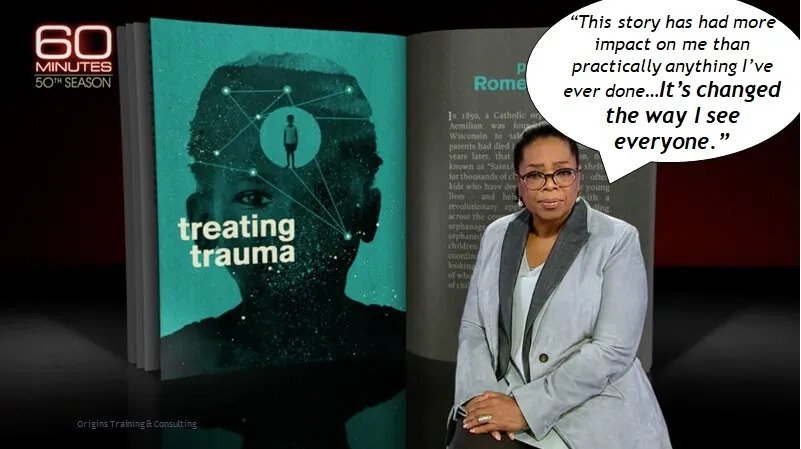/
You know an issue has momentum when Oprah is talking about it!
In a 60 Minutes segment aired in March 2018, Oprah talks about the impact of Adverse Childhood Experiences (ACEs) and a trauma-informed approach. She described the story as one that had “more impact on me than practically anything I’ve ever done.” That’s a lot coming from Oprah!
As we pass the 20-year anniversary of the publication of the original Adverse Childhood Experiences (ACE) study, the landmark study that demonstrated the relationship between childhood trauma and adult health outcomes and behaviors, the resilience-building movement continues to grow.
Since that time, we have seen additional studies that have expanded the ACE framework to include other sources of toxic stress such as community violence and racism. We have also seen the framework applied to different populations and communities across the globe.
And we have heard stories about communities who have applied a resilience-building approach. In the 1990’s, Washington state implemented the Self-Healing Communities model, a resilience-building program designed to tackle issues such as domestic violence, youth substance use, drop-out rates, and other tough issues faced by families and children in dozens of communities across the state. The impact on these communities was profound. In over 10 to 15 years in Cowlitz County, Washington:
- Births to teen mothers went down 62% and infant mortality went down 43%;
- Youth suicide and suicide attempts went down 98%;
- Youth arrests for violent crime dropped 53%; and
- High school dropout rates decreased by 47%;
We have seen other communities—from Tarpon Springs, Florida to Alberta, Canada, embark on similar efforts. (for more information, see Community Resilience Cookbook).
In our own trauma-informed professional development trainings, we have been inspired by leaders who are making changes in their own communities and organizations. Our participants have come from a variety of settings, including education, probation, social advocacy, health care (mental & physical), faith and spirituality, home visiting, and athletics and have come from diverse geographies across the United States and the world, including South Africa, Japan, and the Philippines.
In the midst of all of this momentum, we are excited to announce the online version of The Basics training, available now, and a 2.0 version of our Resilience Champion Certificate, with our next cohort starting in April 2019. You can learn more about all off our trainings at originstraining.org.
Our 90-minute Basics training provides an overview of the key concepts that establish a foundation for a trauma-informed and resilience-building approach, including the following:
- The Adverse Childhood Experiences Framework: In this section, we will explore the link between toxic stress and health outcomes and behavior. In addition to reviewing the findings of the original ACE study, related research that utilizes the study’s framework will also be shared.
- Social and Historical Trauma: In this section, we will cover the key principles of social, historical, and systemic adversity. We will also review the role of epigenetics and how individuals, groups, and societies can be affected by adverse community experiences across generations.
- The Body and Brain: In this section, we will examine how the body and brain are affected by toxic stress. We will define different types of stress and explain how it can become toxic. We will also explain the body’s response to positive and toxic stress.
- Resilience: In this section, we will define resilience, identify how protective factors can help heal the impact of trauma, and discuss how resilience can be built and sustained in individuals, organizations, and communities.
The Basics is designed to provide a shared language that can be used across a variety of sectors, including education, healthcare, law enforcement, social services, child welfare, criminal justice and more, or, in a cross-sector approach. This training gives each participant a solid foundation in the key concepts behind a trauma-informed and resilience-building approach.
The Resilience Champion Certificate is a self-paced 6-week online training designed for individuals or teams who want to apply the concepts from The Basics to their own setting and lead their organizations or communities on the path to resilience. We have incorporated feedback from 3 cohorts in 2018 and are excited to offer a new and improved 2.0 version, with our next cohort launching in April 2019.
We created The Resilience Champion program because, as trainers, the biggest question we often hear is something along the lines of “Ok, I get ACEs. But what can I do about it?”
This program is designed to help people get out of the starting gate and move from Aha! To Action. Since the program started in January 2018, we have supported over 50 leaders in creating concrete goals and implementation plans to build resilience in their own organizations and communities.
In this training, participants are asked to choose a setting to focus on and then walked through a process to assess that setting, create goals for that setting, and create a implementation plan for activities to meet those goals. We highlight cross-sector examples of Resilience Champions throughout the course, with the goal of providing concrete ideas of interventions that have worked. The program is rooted in the human-centered design philosophy that “the people who face the problems every day are the ones who hold the key to their answer” and pulls concepts and tools from a range of disciplines in leadership development, strategic planning, and implementation practices.
As Oprah said about her 60 Minutes segment, “This story was life-changing for me.”
Join us and let’s inspire change in communities together.
Lori & Andi
Follow us on IG, TW, FB: @Originstc, @Andifetzner #otcbasics #resiliencechampion







 Getting Started: A Guide from Trauma to Resilience
Getting Started: A Guide from Trauma to Resilience
Leave a Reply
Want to join the discussion?Feel free to contribute!